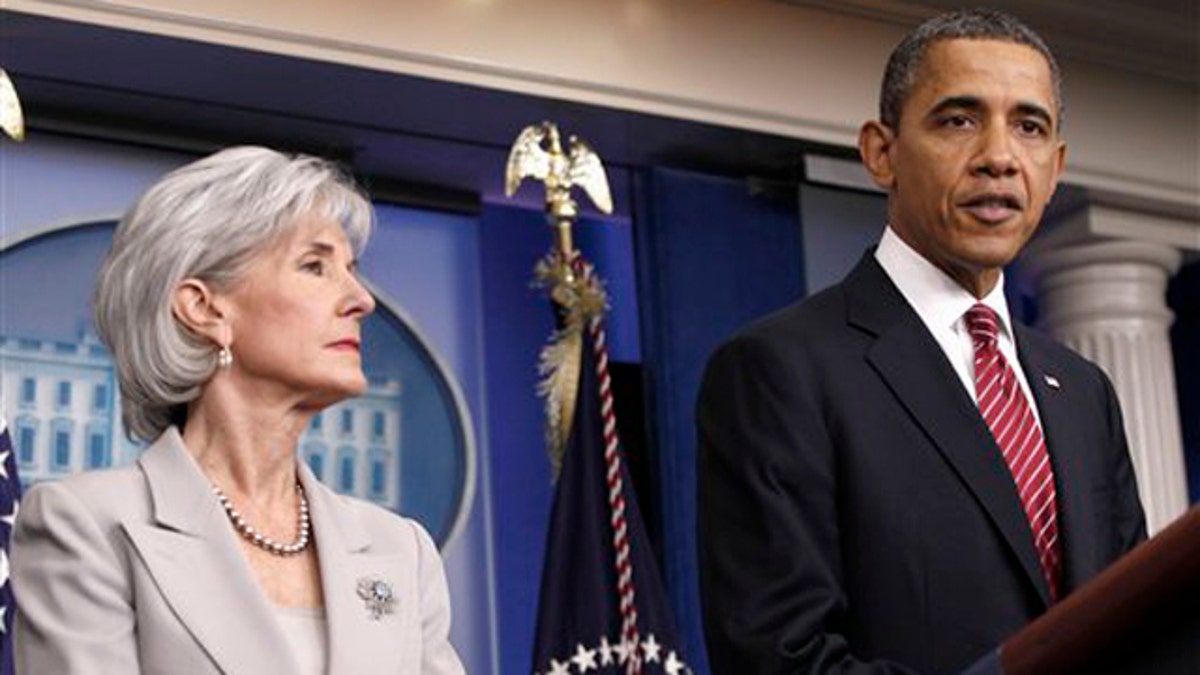
Feb. 10, 2012: President Obama, accompanied by Health and Human Services Secretary Kathleen Sebelius, announces the revamp of his contraception policy at the White House. (AP)
President Obama's "accommodation" to religious organizations earlier this month on the contraceptive coverage mandate has not quelled the furor as at least a half-dozen groups, primarily small, religiously affiliated colleges and universities, take the administration to court over the rule.
"The First Amendment protects Americans from mandates that require us to act against our own convictions," Geneva College President Ken Smith said in a statement.
But while the smaller schools are assailing the Obama administration in federal court over what they claim is an attack on First Amendment freedoms, big-time Catholic universities like Notre Dame and Georgetown appear to be hanging back -- some, like Georgetown, already offer optional contraceptive coverage.
The Alliance Defense Fund filed suit Tuesday on behalf of Geneva College, a Christian-affiliated school in Pennsylvania. The ADF also filed suit over the weekend on behalf of Louisiana College, a private Baptist institution.
Separately, the Becket Fund for Religious Liberty has filed suit on behalf of four groups -- Ave Maria University, a Catholic school in Florida; Belmont Abbey College, a North Carolina Catholic college; Colorado Christian University and the Eternal Word Television Network.
The legal maneuvers come as groups like the U.S. Conference of Catholic Bishops express deep concerns about the rule.
Obama and Health and Human Services Secretary Kathleen Sebelius earlier this month tried to tamp down the controversy about the coverage requirement by announcing what was described as an "accommodation."
The change would allow religiously affiliated organizations like schools and hospitals to refuse to cover contraceptive care. But the insurers themselves would be required to make contraception available free of charge to women anyway. That, say opponents, is no good since many of the groups are self-insured.
But in the wake of the decision, some major religiously affiliated schools appear to be reserving judgment.
Stacy Kerr, a spokeswoman at Georgetown University, said the university is "watching closely and evaluating our options, ever mindful of our Catholic and Jesuit identity and mission."
In an email to FoxNews.com, Kerr said the school is looking at the details of the revised plan to see how it would be affected.
She noted that the university provides employees access to plans that do not cover birth control, as well as plans that do.
"If there are any changes to the law, Georgetown will continue to provide health insurance that is legally compliant," Kerr said.
The University of Notre Dame likewise said in a statement that it would "continue to monitor the situation and work in collaboration with the U.S. bishops, other faith-based organizations and the administration to arrive at an acceptable conclusion."
The college president, Rev. John Jenkins, in September wrote to Sebelius expressing concern about the contraceptive mandate. He wrote that the earlier rule would require the school to offer coverage for sterilization, contraceptives and the so-called morning-after pill "in violation of the Church's moral teaching."
According to a recent article in the campus newspaper The Observer, Jenkins praised the administration's revision as a "welcome step." But he also expressed concern about "unclear and unresolved issues."
And the article noted that the change would not necessarily do anything for Notre Dame because the university self-insures. One professor told The Observer the school will still be required to offer contraceptive coverage despite the change.
Boston College, another prominent Catholic-affiliated school, has been quiet on the contraceptive coverage mandate front -- though the college reportedly already offers contraceptive coverage. A representative with the college did not return a request for comment.
Some states already have contraceptive coverage requirements. And the National Women's Law Center recently compiled a list of roughly three-dozen Catholic-affiliated schools that offer some form of that coverage -- though sometimes in very limited circumstances.
White House Press Secretary Jay Carney on Tuesday downplayed the latest string of lawsuits related to the federal requirement.
"The president's focus was on finding the right balance," Carney said. "And we are continuing to work with stakeholders to implement that solution in a way that we believe satisfies the concerns -- or should satisfy the concerns of those in terms of their religious beliefs.
"The approach was to find that balance, to ensure that the coverage was provided, and to respect religious beliefs. It was not to ensure that everybody said that they were okay with it -- because you often cannot find a solution to difficult issues if that's the approach you take," Carney said.
The Justice Department had no comment on the suits.
























